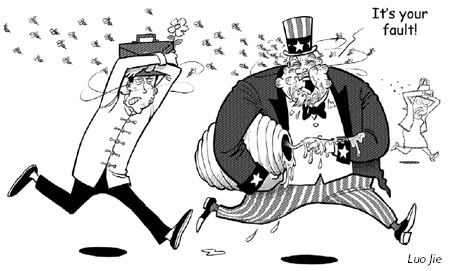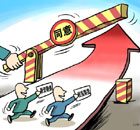Opinion
How not to correct global imbalances
By Dan Steinbock (China Daily)
Updated: 2010-01-12 07:48
 |
Large Medium Small |

In the New York Times, Paul Krugman, an influential liberal economist, opened the new year with a critique of China's currency policy for "predatory mercantilism". If Beijing would not allow the renminbi to appreciate, he warned, "the very mild protectionism (China is) currently complaining about will be the start of something much bigger".
Only a day or two later, an article in the Guardian, the British daily, criticized China's currency policy and went even further, arguing that "(China's) emergence on to the world stage brought with it a key reason for the global economic meltdown between 2007 and 2009."
If one were to take at face value such arguments, one would have to believe that the entire global crisis has had nothing to do with the failure of laissez-faire capitalism, the absence of adequate regulation in the financial sector, the rise of the "shadow economy", the low interest rates, the housing bubbles, the subprime crisis and the credit squeeze in the United States and Western Europe.

In reality, China's exchange rate is not the main reason for the global imbalances; nor was the global crisis triggered by the Chinese currency. An abrupt and significant appreciation of the renminbi would not resolve the crisis - but might make it worse by contributing to instability and dampening prospects for global growth.
Certainly, it is important to address the kind of policy distortions that play a key role in the global imbalances. But what are those distortions, really?
In the past few years, the world's largest deficit has been that of the United States, while the world's largest current account surplus has been held by China. As a result, some economists and many politicians argue that China's surplus is the cause of US deficit. In fact, the causal link is tenuous at best.
Trade deficit is not necessarily harmful. It is really a reflection of the imbalance between domestic investment and domestic saving. For years, US savings have been declining, but domestic investment has not. While Americans have saved less and less, foreigners have invested more and more in America. As a result, US current account deficit has ballooned.
Also, while the US-China relationship may well be the most important one in the 21st century, their bilateral trade accounted for only 3 percent of world trade in 2008. Indeed, global imbalances involve much more than just the US-China trading relationship.
Finally, today foreign investment plays an increasing role in total investment. If, for instance, foreigners invest more in America, the US current account deficit will rise, unless something else changes. At the end of 2008, foreigners held US assets equal to about 160 percent of US GDP, but only a fraction of these - about 5 percent - were held by China.













